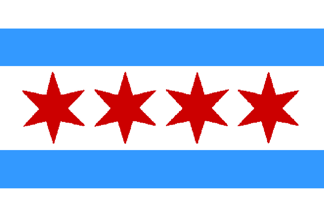 2:3 image(s) by permission of David B. Martucci
2:3 image(s) by permission of David B. Martucciimage(s) from American City Flags, Raven 9-10 (2002-2003), courtesy of the North American Vexillological Association, which retains copyright.

Last modified: 2024-03-23 by rick wyatt
Keywords: chicago | illinois | star | world's fair | cook county |
Links: FOTW homepage |
search |
disclaimer and copyright |
write us |
mirrors
 2:3 image(s) by permission of David B. Martucci
2:3 image(s) by permission of David B. Martucci
image(s) from American City Flags,
Raven 9-10 (2002-2003),
courtesy of the North American Vexillological Association, which retains copyright.
See also:
Text and image(s) from American City Flags, Raven 9-10 (2002-2003), courtesy of the North American Vexillological Association, which retains copyright. Image(s) from American City Flags by permission of David B. Martucci.
Chicago's flag has a white field with two blue horizontal stripes, each about one-sixth of the width of the hoist, and set slightly less than one-sixth of the way from the top and bottom. Between the two blue stripes are four bright red six-pointed stars, spaced evenly across the center horizontally.
Currently the points of the flag's stars are shortened and not as exaggerated
as earlier versions. The shade of the blue color is not specified, but
in practice tends to be a medium blue.
John M. Purcell, American City Flags,
Raven
9-10,
2002-2003
The white stripes represent the North, West and South sides of the city. The two blue stripes symbolize Lake Michigan plus the North Branch of the Chicago River, and South Branch of the Chicago River plus the Great Canal. The symbolism of the stars is complex. Here is how it is described:
The "Fort Dearborn" star was the last added to the flag in 1938, however when this was done, it was placed in chronological order so it is the star closest to the hoist. In my ongoing research, I discovered that the original ordinance designated the star as representing "The Fort Dearborn Massacre." But as there seem to be questions about the accuracy and interpretation of the accounts of that incident, the current information from the City of Chicago simply states that the star represents the fort itself.
David Breitenbach, gwav.tripod.com/issue_10.htm, 19 June 2008
In 1939, the fourth star was added to the flag, together with the additional
symbolism ascribed to the points of the stars. Although no mention
was made of changes to the pennant or badge, in practice the fourth
star would presumably be added to them as well.
John M. Purcell, American City Flags,
Raven
9-10,
2002-2003
In 1915, Alderman James A. Kearns proposed to
the city council that Chicago have a civic flag. The council agreed and
established the Chicago Flag Commission, which held a contest and
offered a prize for the winning design. This design [the
two-star flag] was submitted on
28 March 1917 and adopted by the city council in the summer of 1917.
John M. Purcell, American City Flags,
Raven
9-10,
2002-2003
The winner of the competition was Mr. Wallace Rice, an author and editor, who
had been interested in flags since his boyhood. He worked on his design for
approximately six weeks.
John M. Purcell, American City Flags,
Raven
9-10,
2002-2003
Probably because of the requirement that municipal buildings fly the
city flag, Chicago's flag flies widely throughout the city on police stations,
fire stations, libraries and schools, and no doubt is among the
most recognized civic flags in the nation. It is certainly well known by
the citizens of Chicago. When a police officer or firefighter dies, the
Chicago flag drapes the casket. The flag's four-star motif has come to
characterize the city, painted on its street signs, appearing on uniforms
of police and firefighters, and even imprinted in concrete railings, sidewalks,
and bridge abutments.
John M. Purcell, American City Flags,
Raven
9-10,
2002-2003
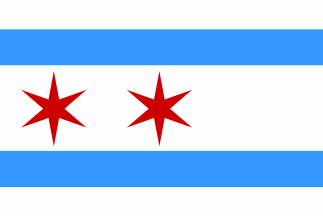 image by Rob Raeside, 21 August 2014
image by Rob Raeside, 21 August 2014
Here is the short insert of the original Chicago city flag description and meaning of the original design from 1917 (Chicago Daily Tribune, March 29th, 1917, p.13)
OFFER DESIGN FOR CITY FLAG; WHAT IT MEANSValentin Poposki, 23 September 2007
Design for a Chicago Flag, to be emblematic of a robust municipal ideal, was submitted to the city council yesterday by the Chicago municipal flag commission, appointed by Mayor Thompson eighteen months ago. The commission describes the flag thus:
"Its uppermost stripe, of white, is eight inches broad; the second stripe, of blue, is nine inches; the central bar, of white, is eighteen inches, and the two lower stripes correspond with the uppermost two. Near the staff on the broad white stripe are two six pointed red stars, fourteen inches tall."
"Viewed locally, the two blue stripes symbolize the Chicago river with its two branches and the three white bars represent the three sides of the city. The red stars stand for the Chicago fire and the World's fair, two great influences on the city's history. The six points in the first star stand for transportation, trade, finance, industry, populousness, and healthfulness; those in the second for religion, education, aesthetics, beneficence, justice and civism [sic]."
"Considered nationally, the blue stripes stand for the mountain ranges which flank the plain of which Chicago is the center. The central white bar stands for this plain and the two outer white bars for the Atlantic and Pacific coasts."
The flag was designed by Wallace Rice, 2701 Best avenue."
The Chicago flag of 1917-1939 had sharper pointed stars. While no special significance was then attributed to their points, Rice explained that the stars were given six points to avoid confusion with the five-pointed stars on the national flag. Possibly to reinforce this distinction, the first stars had long and rather sharp points; their form persisted for several decades.
Ben Cahoon, 21 August 2014
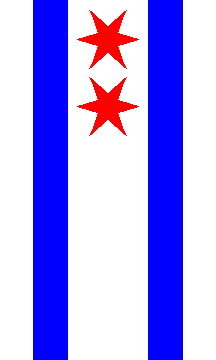 image by Peter Hans van den Muijzenberg, 21 March 2009
image by Peter Hans van den Muijzenberg, 21 March 2009
The original 2-star flag is illustrated on The Great Chicago Fire and Web of Memory page at www.chicagohs.org/fire/commemorate/pic0132.html.
Valentin Poposki, 3 January 2009
Google Books published The Chicago municipal code of 1922. In this code is information regarding the city flag and other types of flags. About the city flag itself (having only two stars at the time), this is what the code has:
1017. The Chicago municipal flag. The Chicago municipal flag shall be white, with two blue bars, each taking up a sixth of its space, and set a little less than one-sixth of the way from the top and bottom of the flag, respectively. There shall be two bright red stars with sharp points, six in number, set side by side, close together, next the staff in the middle third of the surface of the flag.
1023 of the same code mentions the flag can have the ratios of 2x3 or 3x5.
The code also has the following types of flags:
1018. The municipal standard. The municipal standard shall be made of silk and fringed with gold composed of the same colors, hues and parts as provided for in section 1017.
1019. The municipal pennant. The municipal pennant shall be a long streamer showing the two stars on white at the staff, the fly being equally divided, blue and white. For the pennant, the ratios stated in 1023 of the code is either 2x15 or 2x20. There is no mention about the shape of the pennant other than a streamer.
Zachary Harden, 6 March 2011
The "a little less then one-sixth", I've taken as 1/6th again of the width of the bars. The stars I've drawn at the full 1/3rd of the flag's height. This slightly smaller off-set of the bars serves to separate the stars from the bars, and that same margin I used at at the other sides of the stars, though only once between them as they are close together. The sharp points I assumed to refer to the stars being lean. For the blue I used general blue, as there's no indication of a lighter shade at that time.
Peter Hans van den Muijzenberg, 22 March 2011
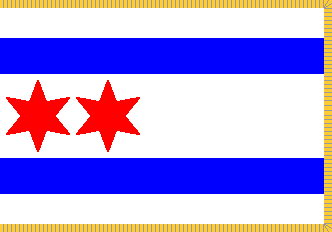 image by Peter Hans van den Muijzenberg, 22 March 2011
image by Peter Hans van den Muijzenberg, 22 March 2011
 image by Peter Hans van den Muijzenberg, 22 March 2011
image by Peter Hans van den Muijzenberg, 22 March 2011
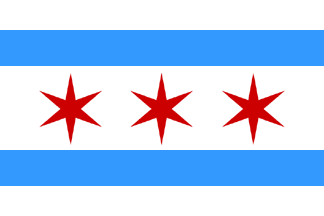 image by António Martins-Tuválkin, 23 September 2023
image by António Martins-Tuválkin, 23 September 2023
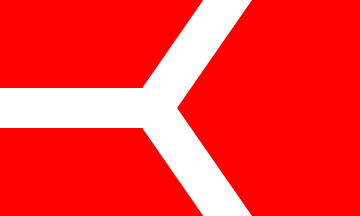 image by António Martins-Tuválkin, 24 September 2023
image by António Martins-Tuválkin, 24 September 2023
based on image located by Valentin Poposki, 25 August 2020
I found a colored version of the drawing of the first Chicago flag of 1892.
Here is a video from YouTube:
https://www.youtube.com/watch?v=O26LqkDMZqI
And two links to
documented story about the first Chicago flag
https://medium.com/@robertloerzel/the-story-of-chicagos-four-star-city-flag-4042dc579cb2
https://www.chicagotribune.com/news/ct-chicago-flag-origins-flag-day-htmlstory.html
Valentin Poposki, 25 August 2020
A red flag, apparently ~3:5 with a white "Y" shape throughout, lying
horizontally with its base on the middle of the hoist and the two symmetrical
arms reaching the tip and bottom edges of the flag.
The way I interpret
the sketch, the three arms of the "Y"
meet at equal angles of 120° each, and the whole device is set in such a way
that at the fly there's a vertical area that’s fully red as wide as half the
height of the flag.
António Martins-Tuválkin, 24 September 2023
![[City Seal]](../images/u/us-il-ch).gif) located by Paul Bassinson, 10 July 2019
located by Paul Bassinson, 10 July 2019
Image obtained from
https://www.chipublib.org/
Paul Bassinson, 10 July
2019
The flag of Chicago turned 100 on 4 April 2017. Two websites carry details
about the flag:
-
www.chicagomag.com
-
chicagotonight.wttw.com (with John Hartvigsen)
Vexinews, 8 April 2017
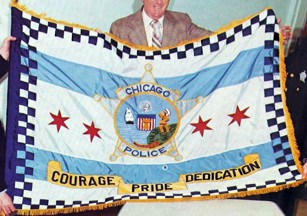 image located by William Garrison, 21 November 2023
image located by William Garrison, 21 November 2023
Source:
https://chicagocop.com/history/symbols/the-official-flag-of-the-chicago-police-department/
Original caption: "In early 1976, the idea of a Police flag was
submitted to the Research and Development Division (R&D) by Patrolman Charles E.
Springer of the 4th District, a 15 year veteran with the Chicago Police
Department. Approved by Superintendent James M. Rochford, the suggestion was
assigned to three R&D analysts to develop: Sergeant Frank Kohnen, Sergeant
Howard Knight and Patrolman Jack Pecoraro. Kohnen, Knight and Pecoraro made a
number of sketches as to what they felt the flag should contain and these were
turned over to Otis Rathel, Commanding Officer of the Graphic Arts Section.
Rathel made a final artist rendering and which was submitted to the
Superintendent, who approved its design. The design was then given to a flag
manufacturer to be produced. In April of 1977, the flag was unveiled during
ceremony and it became the first official flag of the Chicago Police
Department". ....
The symbolic meaning of the Flag is as follows:
The Gold Fringe
- Pays tribute to command and supervisory personnel who
lead and direct Department members towards achieving the Department's goal of
providing the best and most effective law enforcement for citizens.
- The
pattern of Blue and White squares represents the dedication of Chicago Police
Officers to provide protection and service to Chicago citizens.
The
Checkerboard Design
- Signifies the many and varied duties and
responsibilities of Chicago Police Officers.
- The pattern of Blue and White
squares represents the dedication of Chicago Police Officers to provide
protection and service to Chicago citizens.
The Blue Stripes and White
Background
- Expresses the Department's commitment to serve every community.
The Red Stars:
- The First Red Star represents Fort Dearborn (added by
City Council in 1939). The Points of the First Red Star Signify: Transportation,
Labor, Commerce, Finance, Populousness, and Salubrity [sic].
- The Second Red
Star represents the Chicago Fire of October 8-10, 1871. The Points of the Second
Red Star Signify: Religion, Education, Esthetics, Justice, Beneficence, and
Civic Pride.
- The Third Red Star represents the World's Columbian Exposition
of 1893. The Points of the Third Red Star Signify History of the Area: France
1693, Great Britain 1763, Virginia 1778, Northwest Territory 1798, Indian
Territory 1802, and Illinois Statehood 1818.
- The Fourth Red Star represents
the Century of Progress Exposition of 1933 (added by City Council in 1933) The
Points of the Fourth Red Star Signify: World's Third Largest City, City's Latin
Motto, "I will" Motto, Great Central Market, Wonder City, and Convention City.
The Silver Star
-. Centered over the geographical symbols of the city.
- The star represents members of the Chicago Police Department.
. The city
seal superimposed on the star signifies the that the Department derives its
authority from the city.
The Streamer - "Courage, Pride, Dedication"
-
COURAGE, for individual valor and selflessness.
- PRIDE, in the Department
and its members.
- DEDICATION, to accomplish the stated goals of the
Department.
William Garrison, 21 November 2023
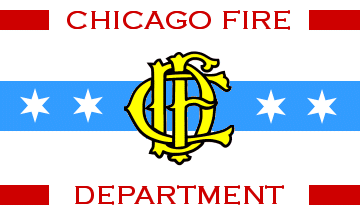 image by Randy Young, 23 April 2015
image by Randy Young, 23 April 2015
based on a photo located by Ned Smith, 26 June 2005, source: www.chicagofirestore.com
I found full-frame photos of the Department's flag. The graphic is made according to the design elements visible in several photographs.
Randy Young, 23 April 2015
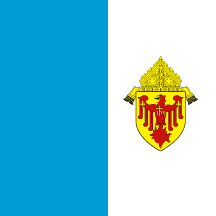 image located by Daniel Rentería, 28 August 2022
image located by Daniel Rentería, 28 August 2022
In an image found in an article published by the Daily Herald is the flag of
the Archdiocese of Chicago. A flag was found in the article, which I have used
to adapt a drawing of the flag from Wikimedia Commons.
Daniel Rentería, 28 August 2022
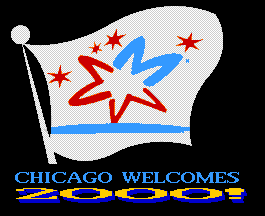 image by Steve Stringfellow, 23 December 1999
image by Steve Stringfellow, 23 December 1999
This flag is being used by the City of Chicago, Bureau of Tourism, to welcome visitors to Chicago, especially for the year 2000 celebration. The mayor of this city, Richard M. Daley, has invited regular everyday people from all over the world to dinner New Year's Eve in Chicago.
Steve Stringfellow, 23 December 1999
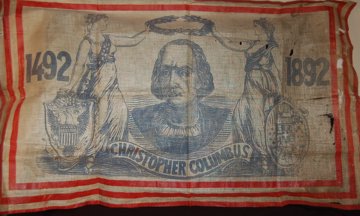 image located by Katherine Janush
image located by Katherine Janush
We have what we think is a flag from the 1893 World's Fair. It shows Christopher Columbus and the dates 1492-1892. It was purchased by my friend's father in 1906 or 1907, in New York, for $1.50. They had a few more things that they said were from the Columbian Exposition but most of those have been sold. We assume this was also from the Columbian Expo in Chicago.
Katherine Janush, 16 December 2006
See also: World Fairs
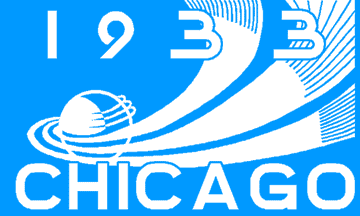 image by António Martins-Tuválkin, 3 December 2001
image by António Martins-Tuválkin, 3 December 2001
See also: World Fairs
Postcards at Ebay, showing the Chicago world fair of 1933-34 Avenue of Flags. Together they apparently show the avenue in both directions, with all of it lined with, you guessed it: Flags. They appear to be cut to hang straight from an angled staff, and it may be they also taper, but I'm not sure.
These three show a photograph towards the North, where Stars and Stripes fly at the North Entrance, with outside the Fair the Shedd Aquarium, opened a few years earlier:
one,
two,
three. The flags are red with a yellow stripe along the "bottom".
This one shows a photograph towards the South. This was the view from the gates: An avenue filled with flags, leading to the Hall of Science: Here the flags are similar, but have a black separator line. I can't decide whether those were in the photograph or not.
The first three just mention 1933, but only as the centennial of 1833, the last also mentions just 1933 but has a 21 August 1934 stamp.
Another (no longer available) shows the avenue towards the North again. Here the flags are all red, slightly on the purplish side. This postcard explicitly says it shows Chicago's 1934 International Exposition. That would suggest that the flags differed between the years: 1933 with yellow stripe, 1934 without and maybe a bit more purplish.
Peter Hans van den Muijzenberg, 22 January 2016
For 1904, the Olympic Games were to be organised in the United States for the
first time. In 1901, the Olympic Committee awarded these Games to Chicago, but
eventually the Games were held in St. Louis.
For 1952, Chicago bid again
to host the Olympics, but instead those were rewarded to Helsinki, who had been
the appointed host for 1940 when the originally selected host, Tokyo, was no
longer considered acceptable as host for the Olympics.
For 1956, Chicago
bid again to host the Olympics, but instead those were rewarded to Melbourne, as
the first Olympics mostly in the Southern Hemisphere.
For 2016, Chicago
bid again to host the Olympics, but instead those were rewarded to Rio the
Janeiro, as the first Olympics in South America.
Considering that even
the intended hosts of the 1916 Olympics, Berlin, eventually got to organise the
Games of a later Olympiad, it would appear that Chicago is not the first city
awarded the Games of the Olympiad that didn't get to host them, but also the
only host city appointed by the IOC that still hasn't been allowed to organise
the Games of the Olympiad at all.
It's likely none of the earlier bids
had a Chicago bid flag: They do understand about flag for events in Chicago, as
can be seen from the 1893 and 1933/34 World's Fairs but those were for actual
events, rather than just for bids. However, the 2016 bid definitely did have
one; it likely even had more than one. For a while, I was unable to find the
first design, but for some reason, I now can easily find it. So far, though, I
haven't found a flag to show it.
 image by Peter Hans van den Muijzenberg, 10 March 2019
image by Peter Hans van den Muijzenberg, 10 March 2019
In 2006, Chicago revealed a bid logo for
its Olympic effort: It was a plain white flag (~3:5) with the bid campaign logo
on it. At that time, the logo was a gradient-coloured Olympic torch where the
flame on closer observation turns out to show the Chicago skyline. While this
was before the city was an applicant, one would assume flags must have existed
to indicate the efforts of the organisation.
https://www.spudart.org/blog/images/2006/2016-chicago-olympics-logo.gif on
https://www.spudart.org/blog/design-critique-the-chicago-2016-olympics-logo/
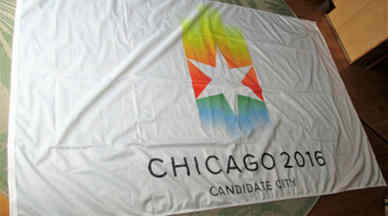 image by Peter Hans van den Muijzenberg, 10 March 2019
image by Peter Hans van den Muijzenberg, 10 March 2019
On 7 February 2007, the IOC decided
that Olympic symbols could only be used by candidate cities and host cities.
Probably because Chicago wasn't as yet an applicant city, their flag bearing
an Olympic Torch wasn't grandfathered in. Unfortunately, the IOC only told
Chicago about this rule change at the start of the bidding process, at 16 May
2007. A new logo would have to be designed to continue the process.
On
14 September 2007, Chicago became an official applicant city. Five days
later, on 19 September 2007, the new flag was revealed, showing the new logo and
the bid's new status. The difference between this
one and the first was that the new logo now had the gradient-colours around
the main charge, with the main charge being a white lean star; the same type
of star as on the Chicago city flag. The status was apparently indicated as
"Candidate City" (in all-caps), even though in IOC parlance they were an
"Applicant City". At least, the two versions of this design - after all, it
was never a mere bid flag with this design - differ in whether they include
the Olympic Rings, making the main logo smaller.
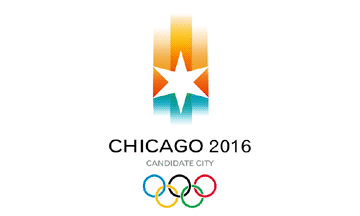 image by António Martins-Tuválkin, 17 January 2009
image by António Martins-Tuválkin, 17 January 2009
On 4 June 2008, Chicago became a Candidate City, and was
therefore allowed to use the Olympic Rings. Their flag was changed
accordingly.
On 2 October
2009, the IOC decided Chicago would remain a host city without games to host.
Peter Hans van den Muijzenberg, 10 March 2019
At www.gettyimages.com/detail/83956350, we can see the Chicago 2016 Olympic bid flag, hoisted along with national, state, and city flags. It is a plain white flag (~3:5) with the bid campaign logo on it.
António Martins-Tuválkin, 17 January 2009
At
https://www.underconsideration.com/brandnew_v1/archives/chicagos_rising_star.php
is the first version of the flag that Chicago was refused the Olympics with this
time.
Peter Hans van den Muijzenberg, 19 September 2023
The Chicago Cubs winning the baseball World Series brings their interesting flag custom to light. A flag with a blue W on a white field is flown from Wrigley Field to signify a Win by the team, while an L flag signifies a loss. Chicago Cubs fans are flying their W flags all over the world. A
Google search will bring up lots of pictures. While the flag itself is Not Of Vexillological Interest, I find it interesting that there's no way to connect the flag to the team unless you know the Wrigley Field tradition - a very odd thing for a sports team-related flag. The only other sports team flag that comes close to that (that I know of) is Michigan State University, which uses a white S on a green field. The S is for either State or Spartans, but either way, without having all 3 letters: MSU, it's less obvious than most. But W for Chicago? You really had to be an insider to know that one, until now!
Terence Martin, 5 November 2016